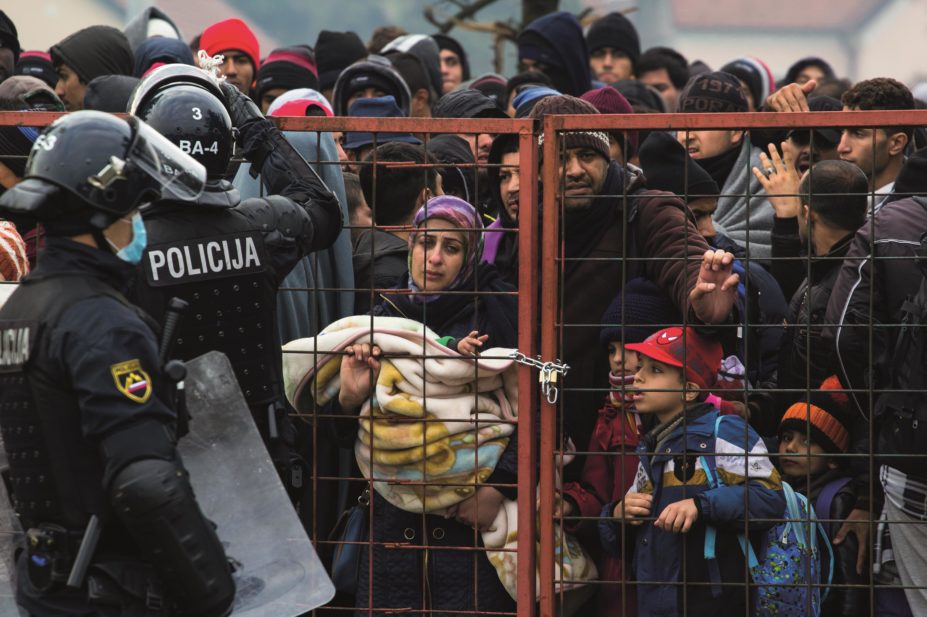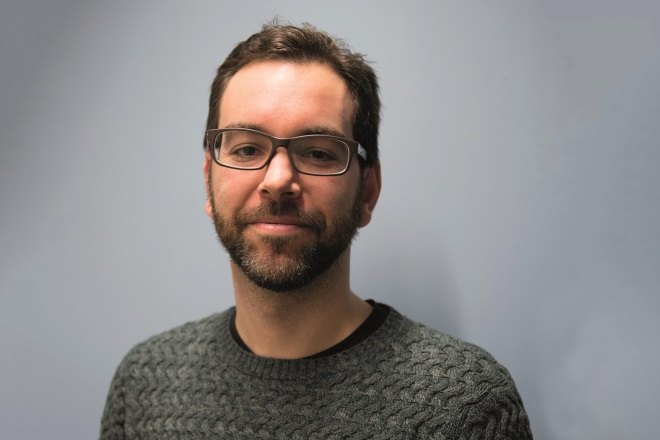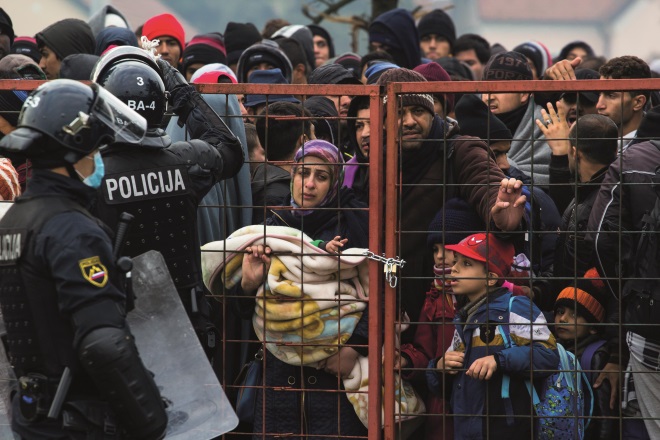
Janossy Gergely / Shutterstock.com

Source: Ikram Ngadi
Miguel Serrano, a pharmacist from Spain, has been working in the humanitarian sector for seven years. Previously, he worked as a field pharmacist in Haiti assisting an emergency obstetrical programme. He also worked in Myanmar, where Médecins Sans Frontières (MSF) has a large cohort of HIV and tuberculosis patients. Currently, he is based in Amsterdam and conducts pharmaceutical market assessments to select the best pharmaceutical products for various MSF programmes.
The European refugee crisis began in 2015, when a rising number of refugees and migrants made the journey to the EU to seek asylum. According to the United Nations High Commissioner for Refugees, the top three nationalities of the around 1 million Mediterranean Sea arrivals in 2015 were Syrian (49%), Afghani (21%) and Iraqi (8%). In April 2015, five boats carrying almost 2,000 migrants to Europe sank in the Mediterranean Sea. The combined death toll was estimated to be more than 1,200 people.
What is the current situation in Europe?
There are two major sea migration routes being used by refugees trying to access Europe: the Eastern Mediterranean (Turkey, Greece) and the Central Mediterranean (Libya, Italy). The majority of people taking the East Mediterranean and Western Balkan journey are coming from countries torn by active conflicts, such as Syria, Iraq and Afghanistan. It is not a new phenomenon. Greece and Spain have faced a flow of migration for years. The central Mediterranean route remains the most deadly and is mostly used by people fleeing from conflict, authoritarian regimes and poverty in countries such as Sudan, Libya, Nigeria, Mali, Senegal, Ghana and Eritrea, to name a few.
There were more than 1 million arrivals to Europe by land and sea in 2015. However, Europe is confronted with a relatively small number compared with global movement. Most displaced people (around 86%) still seek refuge in the neighbouring regions and countries, with Turkey leading and being followed by Pakistan, Lebanon, Iran and Ethiopia.
Syrians represent around two-thirds of arrivals from Eastern Mediterranean route. The profile varies from people who recently left Syria and are coming from an active conflict zone to Syrians who have been living in neighbouring counties, mainly Lebanon and Turkey, where they may have been given a temporary protection status. Underlying all the reported reasons for leaving Syria was the presence of ongoing conflict, and the threat and fear of violence in people’s areas of origin.
MSF and Greenpeace have conducted joint sea operations to provide assistance at sea to boats in distress off the coast of Lesbos island in Greece, in coordination with and in support of the Greek Coast Guard. More than 20,000 people were rescued in 120 separate incidents in the Mediterranean Sea during 2015.
MSF is also working on the Greek islands of Samos, Leros, Kos, Kalymnos and Agathonisi where teams provide medical care, non-food items and shelters for the thousands of refugees and migrants crossing the Aegean Sea. In Idomeni, Greece, MSF is managing water and sanitation for the camp and working with other volunteers in order to provide hot meals to refugees and basic assistance for people in need. In Serbia, MSF teams conduct an average of 1,200 medical consultations per week. In Presevo, MSF has set up several tents for the most vulnerable families to sleep or rest and the team also supports daily transport for families with small children, elderly or disabled persons from the border. At the Croatian border, MSF has built several ‘winterised’ tents and is providing medical consultations.
Operations continue in areas such as the Grande-Synthe, near Dunkirk, France, where MSF is providing 500 tents also equipped for winter that can accommodate five people each, as well as hot water showers and toilets in sufficient numbers for 2,500 refugees. Winter is here, it is cold and it rains. Refugees continue to live in mud on a flood field.

Source: Janossy Gergely / Shutterstock.com
What are the most common medical conditions suffered by refugees?
The main medical conditions include anxiety, headaches, muscle ache, burns, skin diseases (e.g. scabies) and small wounds (caused by the long-distance journeys or violence along the road). There are also cases of dehydration caused by people trying not to drink during the journey because of a lack of toilets.
In the case of the Syrian population, there are chronic non-communicable diseases that were well treated before the start of the conflict and now need reassessments. The medical needs might increase in lower temperatures (e.g. hypothermia, frostbite).
European countries and non-governmental organisations do provide emergency medical assistance along the road. However, this is complicated by language barriers and the urgency people feel to move on to their final destination.
Children are not systematically vaccinated on arrival in Europe or in camps along the road where they stay for extended periods. This is a risk for refugees, as well as the host population, knowing the low vaccination coverage and known vaccine-preventable disease outbreaks in the refugees’ countries of origin.
People may arrive with post-traumatic stress disorders (fleeing from a conflict state and mostly separated from their family and support structures) and there is little mental health support for them. The uncertainty and the lack of clarity of the registration procedure are raising stress levels even higher.
Can you describe the challenges to treating and obtaining medicines for the asylum seekers and migrants?
In some of the destination countries, asylum seekers and migrants are not able to access the official health system. Refugees can only do so after they are registered. On account of the large numbers of arrivals, it can take up to two or three weeks to get registered and, in some cases, even longer. Volunteer doctors are struggling to provide primary health care to these people, and it is difficult to refer to secondary medical services for non-immediate life-threatening illnesses.
This also poses a delay in access to medicines for people with chronic conditions even after arrival. Furthermore, a lack of translators is hampering access to proper care.
What do you do when you run out of medicines?
There have been instances where we have indeed run out of medicines. There are a number of reasons for this. For example, our supply pipeline could be delayed at customs or a transport could be cancelled for security reasons. We try to mitigate these situations by exercising good stock management.
If we do run out of a particular medicine, we investigate the reasons behind it (e.g. prescriber preference, theft, etc). Sometimes we can fix the issue in situ without scrambling to replenish our stocks. Otherwise, we can expedite ongoing orders, seek valid therapeutic alternatives that remain readily at hand or ask for a loan or donation from a partner MSF section present in the same area.
There are circumstances where no stock management measure will prevent us from running out of a medicine. In such cases, we ration the existing stocks by prioritising the most critical cases.
As a last resort, we may rely on local market assessments to find alternatives that suit our patients’ needs. We consider this a risky practice in most of the settings where we are present and thus limit it as much as possible, although this is safer in European markets, where it is easier to find therapeutic alternatives from qualified sources.
How do you ensure medicines are kept in optimal conditions for use in such adverse conditions?
We implement a strict organisational policy requiring us to transport and store pharmaceutical products according to the manufacturer’s specifications. Of course, excursions above and below the recommended temperature and humidity ranges do happen. And when they do happen, we apply quality risk management principles in order to decide what to do with the affected stock. The patient’s interest always comes first.
Our field pharmacists and logistical department colleagues play a crucial role in our compliance with good distribution practices, especially with items requiring cold chain storage.
We do not consider it appropriate to send medicines that have previously been dispensed to another patient because the quality may be compromised
Is there a problem with counterfeit medicines being sold to refugees?
It is common for people to take advantage of victims of natural and manmade disasters. As such, we see problems with counterfeit or substandard pharmaceuticals frequently, but most of them occur in Sub-Saharan and Asian countries. This is not so common in Europe.
MSF prefers to use its own medical supply centres whenever possible. We prefer to control the medical supply chain as much as possible because this reduces the risk of introducing and using substandard products in our humanitarian programmes. Be it for a lack of resources, capacity or corruption, many regulatory agencies in the areas where we work are currently unable to control the medicines and medical devices being sold in their markets.
The products that have been selected by MSF supply centres benefit from a thorough quality assurance scheme. This includes a full pharmaceutical dossier assessment, similar to the ones requested by stringent regulatory authorities. MSF will only select manufacturers and wholesalers that abide by internationally recognised standards of good manufacturing practices and good distribution practices, respectively. When possible, we prefer generic medicines that have been prequalified by the World Health Organization, [which helps to ensure that medicines supplied by procurement agencies meet acceptable standards of quality, safety and efficacy].
On the other hand, being an organisation present in over 60 countries, we benefit from pool-procuring our medical products. The larger the purchase volume, the cheaper the individual unit may become; this allows us to rationalise and run our programmes more efficiently. We feel accountable to our donors, which are mostly private individuals, and want to make their contribution count as much as possible. Having stock readily available in our supply centres also helps us to respond faster in emergencies.
We cannot, unfortunately, use all the products in our European medical supply centres. The regulatory authorities have, for all the right reasons, a tight control over their markets and require each product to have a valid market authorisation within their territory. Despite our quality assurance scheme, not all the products in our assortment list are registered in Europe. Authorities may also restrict our access to private wholesalers.
The main difficulty lies in obtaining adequate pharmaceutical and medical licences. This involves specialised human resources and premises. Such processes, developed to protect the patients, can be somewhat bureaucratic and delay our interventions. Working in a large number of countries, and all having specific legal requirements, it is difficult to provide fast responses everywhere.
What is the biggest challenge to healthcare workers dealing with the refugee crisis?
The current situation for refugees and migrants in Europe is linked to a much larger issue. The crisis per se is not in Europe, but in the places of origin that people are fleeing from and along routes. This crisis, however, is fuelled by the inadequate response and support provided by the European states. Providing medical care to mobile populations is only a small part of the puzzle. Real improvements for these people will only take place when there is political will and policies reducing harm rather than creating it.
Globally, the number of conflicts and the absolute number of refugees and vulnerable migrants is rapidly increasing while protracted displacement is more common than ever before. This is the largest crisis of human displacement since the Second World War linked to unparalleled levels of violence, conflict, persecution, and human rights violations.
Through its projects working with people on the move across the world, MSF sees how restrictive migration policies and practices lead to unacceptable medical and humanitarian consequences. There is an inherent contradiction between respect for basic rights and a migration agenda. States need to reprioritise their approaches to the global displacement and migration crises, and the causes and consequences of these, to ensure that their policies do not cause harm, and that they meet their obligations under refugee, asylum and human rights laws.
Field pharmacists play a crucial role in forecasting the medical needs of our programmes
What can pharmacists in the UK do to help?
They can do so in a number of ways. If their background is adequate, they may consider volunteering in one of our missions. Field pharmacists play a crucial role in forecasting the medical needs of our programmes, as well as following up on whether prescribers and patients are adhering correctly to therapeutic protocols. Pharmacists participate in ethical and hygiene committees in hospitals, are involved in difficult drug rationing decisions, help recall problematic items and train dispensers and other medical and paramedical professions in issues regarding medicines.
On the other hand, community pharmacists can help with relevant health information campaigns. In all major emergencies, humanitarian endeavours are somewhat hampered by habitually goodwilled but unplanned and unwanted medical donations. For example, we do not consider it appropriate to send medicines that have previously been dispensed to another patient because the quality may be compromised or the indication may not match the needs of the population in need. It takes a vast amount of time to sort these donations and requires many resources on behalf of the recipient country to dispose of them.
It would be helpful for UK pharmacists to obtain information on government initiatives regarding the provision of medicines and care to refugees and asylum seekers arriving there and make these readily available to them. Last but not least, we welcome financial contributions.
You may also be interested in
The importance of diverse clinical imagery within health education

Entrustable professional activities: a new approach to supervising trainee pharmacists on clinical placements
